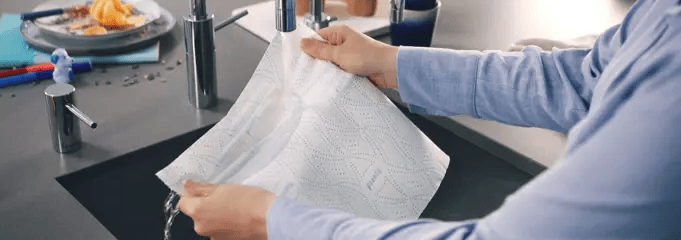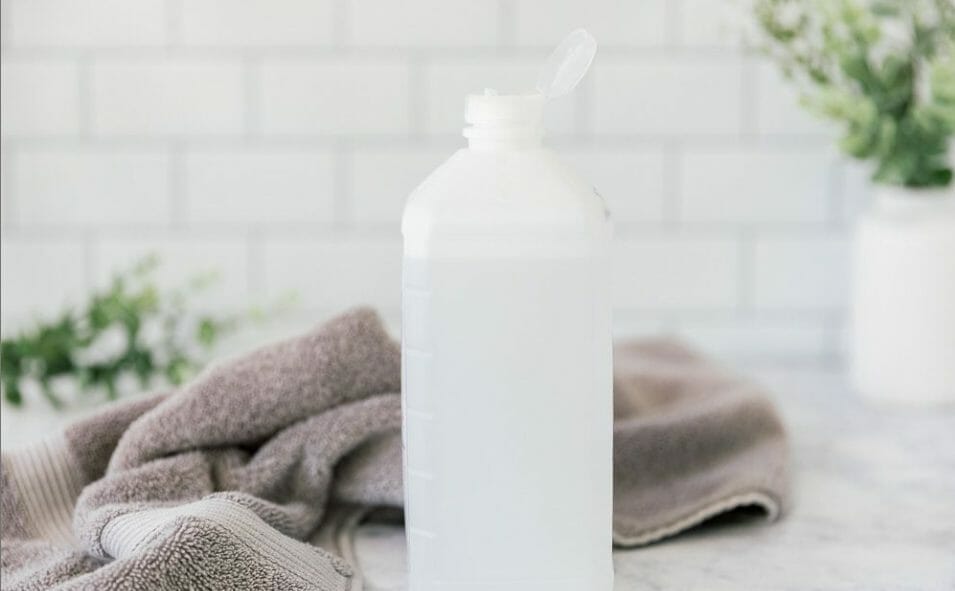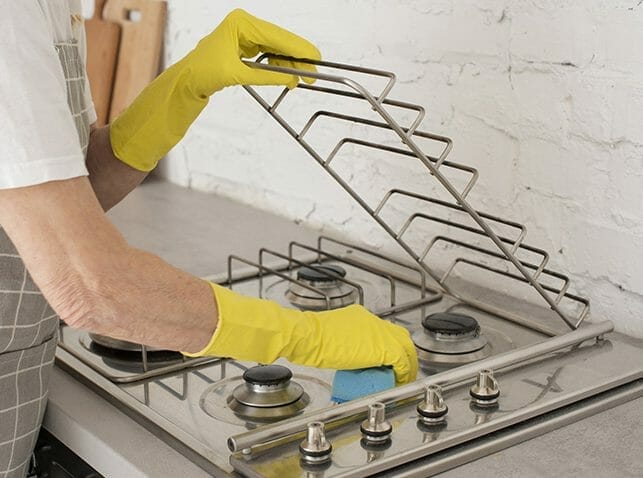If you are a proud owner of stainless steel appliances or surfaces, you know that keeping them clean and shiny can be a challenging task. With so many cleaning agents available in the market, it can be overwhelming to choose the best one for your stainless steel surfaces. One popular cleaning agent that you may have heard of is isopropyl alcohol. But can you use isopropyl alcohol to clean stainless steel? Let’s find out!
Key Takeaways
- Isopropyl alcohol can be used to effectively clean stainless steel surfaces.
- It is important to understand the properties of isopropyl alcohol and the best practices for cleaning stainless steel before using it.
- Alternative cleaning methods, such as using vinegar or microfiber cloths, are also safe and effective for cleaning stainless steel.
Why Stainless Steel Requires Proper Cleaning
Stainless steel is an alloy made from a combination of metals, including iron and chromium. It is known for its durability, resistance to corrosion, and sleek appearance, making it a popular choice for appliances, cookware, and many other household items.
However, despite its many benefits, stainless steel is not completely impervious to damage. Over time, it can become scratched, stained, and dulled if not properly maintained. That’s why regular cleaning is essential to keep stainless steel looking its best.
Why Stainless Steel Requires Proper Cleaning
“Stainless steel is not completely impervious to damage. Over time, it can become scratched, stained, and dulled if not properly maintained.”
There are several key reasons why it’s important to keep stainless steel clean:
- Prevents corrosion: Stainless steel is resistant to rust, but it can still corrode over time if exposed to certain chemicals or minerals. Regular cleaning helps remove these corrosive substances and prevent damage.
- Maintains appearance: Stainless steel has a distinctive and attractive appearance, but it can become dull and discolored if not properly cleaned. Regular cleaning helps maintain its shiny, polished look.
- Removes bacteria: Stainless steel is a popular choice for kitchen appliances and surfaces because it is easy to clean and sanitize. Regular cleaning helps remove bacteria and prevent contamination.
By understanding why stainless steel requires proper cleaning, you can take steps to protect and maintain its appearance and functionality for years to come.
Understanding Isopropyl Alcohol
Isopropyl alcohol, also known as rubbing alcohol, is a common household cleaning agent that is widely used for disinfecting and sanitizing surfaces. It is a colorless, flammable chemical compound with a strong odor and can be found in varying concentrations ranging from 60% to 99%.
Isopropyl alcohol is a powerful solvent that is effective in removing dirt, grime, and grease from a variety of surfaces, including stainless steel. It is a popular choice for cleaning stainless steel appliances due to its ability to cut through stubborn stains, without leaving any residue behind.
However, while isopropyl alcohol may be effective in cleaning stainless steel, it is important to use it properly and with caution. It is essential to understand the chemical properties of isopropyl alcohol and its potential risks before using it as a cleaning agent on stainless steel surfaces.
Pros and Cons of Using Isopropyl Alcohol on Stainless Steel
Isopropyl alcohol is a popular cleaning agent used in various industries due to its effectiveness in breaking down grease, dirt, and grime. It is also commonly used for cleaning stainless steel surfaces, but there are both advantages and disadvantages to using it.
Pros
One of the significant advantages of using isopropyl alcohol to clean stainless steel is that it is a powerful solvent that quickly removes dirt and grime. It is also a disinfectant, which means it can kill bacteria and viruses, making it an excellent option for use in kitchens and hospitals. Additionally, isopropyl alcohol is widely available and affordable, making it a cost-effective solution for cleaning stainless steel surfaces.
Cons
Although isopropyl alcohol is an effective cleaning agent, it can also have some drawbacks when used on stainless steel surfaces. Firstly, it can cause discoloration or staining, especially if it is used for prolonged periods or in high concentrations. Secondly, it can damage the protective film that covers the stainless steel surface, making it more vulnerable to scratches and stains in the future. Lastly, isopropyl alcohol is highly flammable, which means it should be handled with care and kept away from open flames.
When deciding whether to use isopropyl alcohol to clean stainless steel surfaces, it is essential to weigh the pros and cons carefully. If used properly, isopropyl alcohol can be an effective and affordable cleaning agent. However, if not used correctly, it can cause damage and discoloration to stainless steel surfaces.
Best Practices for Cleaning Stainless Steel

Stainless steel is a durable and popular choice for appliances, countertops, and other surfaces. To keep it looking its best, it requires proper cleaning and maintenance. Here are some best practices for cleaning stainless steel:
- Choose the right cleaning products: Use mild, non-abrasive cleaners that are specifically formulated for stainless steel. Avoid using harsh chemicals, bleach, or abrasive scrubbers that can damage the surface.
- Follow the grain: Stainless steel has a grain or direction of the brushed finish. Always clean with the grain to avoid leaving streaks or scratches.
- Use a soft cloth or sponge: To avoid scratching the surface, use a soft cloth or sponge to apply the cleaning solution. Microfiber cloths work well for cleaning stainless steel.
- Rinse thoroughly: After cleaning, rinse the surface thoroughly with water to remove any residue. Dry with a soft cloth or allow to air-dry.
- Regular maintenance: To keep stainless steel looking its best, it’s important to clean it regularly. Wipe up spills and stains as soon as possible and clean the surface at least once a week.
With proper care and maintenance, stainless steel can stay looking its best for years to come.
Steps to Clean Stainless Steel with Isopropyl Alcohol

Cleaning stainless steel with isopropyl alcohol is a simple and effective process. Follow these steps to get the best results:
- Gather your supplies. You will need a clean microfiber cloth, a spray bottle, 70% or 99% isopropyl alcohol, and a soft-bristled brush (optional).
- Prep the surface. Begin by wiping down the stainless steel surface with a damp cloth to remove any loose debris or dirt. Dry the surface with a clean, dry cloth.
- Mix the solution. Pour the isopropyl alcohol into the spray bottle. If you are using 99% isopropyl alcohol, dilute it with water in a 1:1 ratio to prevent streaking.
- Spray the surface. Mist the surface with the isopropyl alcohol solution. Be sure to cover the entire surface evenly.
- Wipe down the surface. Use the microfiber cloth to wipe down the surface, using a circular motion. For tougher stains or grime, you may use a soft-bristled brush to gently scrub the surface.
- Dry the surface. After cleaning, dry the surface with a clean, dry cloth to prevent water spots or streaking.
By following these simple steps, you can effectively clean and maintain your stainless steel surfaces using isopropyl alcohol.
Precautions and Safety Measures
While isopropyl alcohol can be an effective cleaning agent for stainless steel, it is important to take proper precautions to ensure your safety.
First and foremost, always wear protective gloves when handling isopropyl alcohol to avoid skin irritation or chemical burns. It is also important to work in a well-ventilated area to avoid inhaling fumes.
Make sure to keep isopropyl alcohol away from heat sources and open flames, as it is highly flammable. Always store it in a cool, dry place in a container labeled with its contents.
Be cautious when using isopropyl alcohol on surfaces that may be sensitive to it, such as painted or coated stainless steel. If you are unsure, test a small, inconspicuous area first to see how the surface reacts.
Other Effective Cleaning Methods for Stainless Steel

While isopropyl alcohol is a popular and effective cleaner for stainless steel, there are other cleaning methods that you can use to maintain the shine of your stainless steel surfaces. Here are a few options:
- Vinegar and Olive Oil: Mix equal parts vinegar and olive oil in a spray bottle and use it to wipe down your stainless steel surfaces. The vinegar cleans and disinfects, while the olive oil adds a protective layer to the steel.
- Citrus Juice: Lemon or lime juice can be a great alternative to chemical cleaners. Simply squeeze the juice onto a cloth and use it to clean the stainless steel surface. Rinse with water and dry with a clean cloth.
If you prefer to use a commercial cleaner, look for products specifically designed for stainless steel. Always read the instructions carefully to ensure that you are using the product correctly and safely.
It’s important to avoid using harsh chemicals such as chlorine and bleach on stainless steel. These can cause damage and discoloration to the surface.
Read More : Citrus Shine Stainless Steel Cleaner: Sparkling Results!
Conclusion
In conclusion, isopropyl alcohol can be an effective cleaning agent for stainless steel surfaces, but it is important to consider its pros and cons before using it. While it can effectively remove dirt, grime, and fingerprints, it can also leave behind streaks and damage the surface if used improperly. Therefore, it is essential to follow the proper steps and safety measures when cleaning stainless steel with isopropyl alcohol.
However, there are also alternative cleaning methods that are safe and effective for stainless steel surfaces, such as using mild soap and water or specialized stainless steel cleaners. It is important to choose the method that works best for your specific needs and to always follow the manufacturer’s instructions.
In summary, keeping your stainless steel surfaces clean and well-maintained is crucial to their longevity and aesthetic appeal. Consider the different cleaning methods available and choose the one that works best for you and your stainless steel surfaces.
What Are Some Tips for Effortlessly Cleaning a Stainless Steel Hood Using Isopropyl Alcohol?
To effortlessly clean a stainless steel hood, try these top stainless steel hood cleaning tips. First, mix isopropyl alcohol with water in a spray bottle. Then, spray the solution onto the hood and let it sit for a few minutes to loosen grease and grime. Next, use a soft cloth or sponge to gently wipe the surface, following the grain of the stainless steel. Finally, rinse with warm water and dry thoroughly for a sparkling, streak-free shine.
FAQ
Q: Can You Use Isopropyl Alcohol to Clean Stainless Steel?
A: Yes, isopropyl alcohol can be used to clean stainless steel surfaces.
Q: Why Stainless Steel Requires Proper Cleaning
A: Stainless steel requires proper cleaning to maintain its appearance and prevent tarnishing or corrosion.
Q: Understanding Isopropyl Alcohol
A: Isopropyl alcohol is a cleaning agent that is commonly used for disinfecting and cleaning purposes.
Q: Pros and Cons of Using Isopropyl Alcohol on Stainless Steel
A: Using isopropyl alcohol on stainless steel can effectively remove dirt and grime, but it may also strip away any protective coatings or finishes.
Q: Best Practices for Cleaning Stainless Steel
A: To effectively clean stainless steel surfaces, it is recommended to use gentle cleaning agents, avoid abrasive materials, and always follow the grain of the steel.
Q: Steps to Clean Stainless Steel with Isopropyl Alcohol
A: Here is a step-by-step process to clean stainless steel using isopropyl alcohol:
– Dilute the isopropyl alcohol with water.
– Apply the solution to a microfiber cloth.
– Gently wipe the stainless steel surface, following the grain.
– Rinse the surface with clean water and dry it thoroughly.
Q: Precautions and Safety Measures
A: When using isopropyl alcohol to clean, it is important to ensure proper ventilation, avoid open flames or sparks, and keep it away from children and pets.
Q: Other Effective Cleaning Methods for Stainless Steel
A: Besides isopropyl alcohol, other safe and effective methods for cleaning stainless steel include using mild soap and water, vinegar, or specialized stainless steel cleaners.






